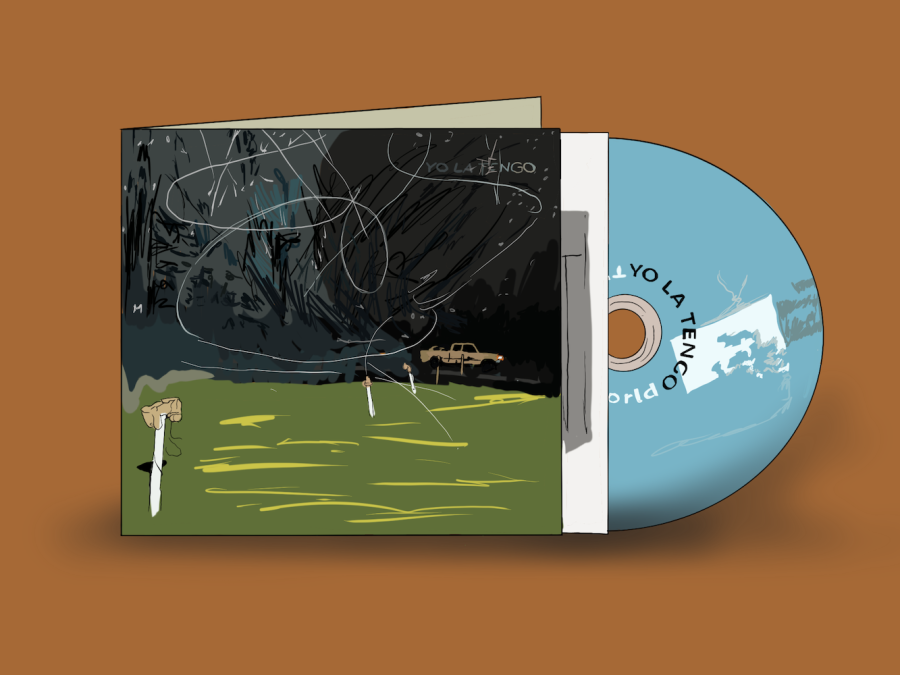Review: Yo La Tengo takes matters into their own hands with ‘This Stupid World’
On their pandemic-era record, the band addresses the world’s lonely and confusing circumstances head-on.
(Illustration by Aaliya Luthra)
February 20, 2023
Few bands remain as description-defying as Yo La Tengo, the three members of which are now closing in on their 40th year together. They’re about as eclectic as they come. Their latest album, “This Stupid World,” feels like one of their most progressive and direct to date.
Yo La Tengo has taken elements of the best bands of the last 70 years — including the ones they themselves inspired — and mixed it all with a pastiche of oddball Americana and an affinity for artists like Bob Dylan and The Velvet Underground. Just as likely to cover a Grateful Dead song as they are to burst into Sun Ra or the theme song from Hanna Barbera’s “The Banana Splits,” the secret ingredient to their longevity has always been their freewheeling, unpretentious versatility.
While they have always excelled at capturing the frenetic sound of their live shows when recording, this latest record has a particularly malleable quality to it. Entirely self-produced by band members Ira Kaplan, Georgia Hubley and James McNew, much of the material on this album came from a series of rehearsals that took place throughout the pandemic. Somewhere along the line, the decision was made that these new songs ought to be recorded as they were conceived: live and all together.
It’s hard not to interpret this methodology as the band taking a stand against the inescapable isolation that we all experienced during quarantine, and this sentiment serves the songs on “This Stupid World” beautifully. Yo La Tengo’s records have often alluded to some greater message, whether it be personal, universal or even pop-cultural. With this album, however, they seem to want to represent something more clearly: the futility of life.
There are few grand stylistic gestures, or surprise departures, from their many past sounds to be found on “This Stupid World.” This record captures the trio at their most focused and immediate. With just nine songs, they deliver a lean set of low-key but throbbingly spaced out meditations, just the sort they have always been able to effortlessly nail. The record is book-ended by two shining examples of those drawn-out, jammy, pulsing long songs that feel so unique to their sound. Opener “Sinatra Drive Breakdown” is a thudding and sparse apocalyptic song, grounded by a droning and repetitive bassline. Kaplan’s wailing guitar is barely held together. Cracking at the seams, he portends, “I see what you see, I see wintеr still / I see clearly how it ends / I see the moon rise as the sun descends.” The trio is fascinated with time, predicting a kind of inevitable end to humanity as they sing in chorus, “Until we all break, until we all break / Until we all break down.”
The following track, “Fallout,” captures a desire to escape the onslaught of time altogether. One of the band’s finest moments, this song feels like it could have come straight off the cutting room floor of one their beloved ‘90s records such as “Electr-O-Pura.” It’s strangely moving to hear Kaplan, McNew and Hubley playing a new song in this style again, but it’s not an exact imitation of their earlier work. They find a renewed sense of wisdom and immediacy in their songwriting, with Kaplan lamenting the misery of introspection, singing “I won’t tell you how it’s gonna be / I don’t have what you want from me” and “It makes me sick / What’s in my mind / It’s so hard to react in kind / I want to fall out of time.” Over rolling waves of a chugging guitar and a thumping, fuzzed-out bassline, Kaplan’s vocals sound as withdrawn and delicately gorgeous as ever.
Bassist and multi-instrumentalist McNew takes on vocal duties on the subversive “Tonight’s Episode,” chant-singing his way into a jazzy call-and-response piece of self-assurance, stating “I’ve got my own plan” and “Milk the cow / I can milk the cow / Mow the lawn / I can mow the lawn / Steal your face / I can steal your face.” Kaplan gets similarly introspective on the Enoesque “Brain Capers,” hypnotically calling out to the voices of Alice Cooper, Rick Moranis and Ray Davies that he seems to be hearing through the storm of fuzz in his head. It’s cryptic, full of extremely niche pop culture references and strangely moving.
The acoustic duo of “Aselestine” and “Until It Happens” form the centerpiece of the album. The former is an intimate, quiet break from the rest of the album, buoyed by a distant pedal steel guitar. The only track on the record sung primarily by Hubley, it’s understated and hopeful, but grows to be a standout with repeated listens. The softness is reminiscent of some of the country-tinged covers on their 2015 album “Stuff Like That There.” Hubley’s moments behind the mic have often been highlights of their catalog, but “Aselstine” stands out as one of her best performances ever.
In contrast, the titular track “This Stupid World” is a cacophonous example of the band at full blast, complete with wailing, multi-minute feedback breaks and sleigh bells that merge into a vicious, slow-burn wall of sound. Over the song’s runtime of seven and a half minutes, the tension builds and Kaplan closes it out with the morbid mantra, “This stupid world / It’s killing me / This stupid world / Is all we have.” In all its earnest simplicity, the statement might feel naive coming from anybody else, but given the sincerity and power of the record and the band behind it, it feels like all that’s left to say.
Contact Holden Lay at [email protected]
























































































































































